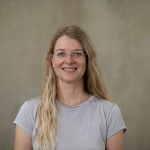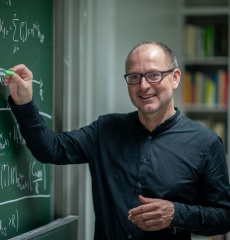A more detailed website (in German) can be found at
Work Activities
My scientific work is in the field of stochastics. This is the mathematics of chance, which includes the study of all phenomena and processes that chance plays into. And these are extremely many, from the stock price development over the weather happening up to the play theory of roulette and Lotto.
Stochastics is a generic term that includes the disciplines of probability theory, mathematical statistics and data analysis. Probability theory deals with the investigation of the laws of random events. Chance is not random either. It too has its laws, which can be determined, analysed and used advantageously in many applications.
On the basis of mathematics, probability theory has developed an abstract formal language that makes it possible to speak meaningfully about random processes and to develop methodical tools for their investigation.
The discipline of statistics was named after the Göttingen law professor Gottfried Achenwall (1719-1772), who coined the term for a statist based on data. In the 18th century she provided the rulers with the information they needed for their government actions in edited form.
Today, statistics as a scientific discipline is understood as the teaching of methods for researching data collectives. Statistics provides the systematic concepts to bridge the gap between empiricism and theory, i.e. between what has been observed and the models that are to be used to explain what has been observed.
Mathematical statistics is specifically the theory of the analysis of data using mathematical methods. Its aim is to derive from data, by mathematical means, the causal complexes which they have produced, or in other words: to bring to light from data, by mathematics, the information contained in them.
This ability to derive knowledge from data that enables well-founded and problem-oriented decisions to be made is a key competence of the information age. Today, data is collected in all sciences and in all areas of life. There are now more numbers on our planet than there are words. Those who can interpret numbers correctly will make better decisions. Already at the beginning of the last century H.G. Wells predicted: "One day statistical thinking will be as important for life as the ability to read and write". And he's right.
Expert Service for journalists
Science is hard-won truth-finding. But often we only create half-truths and then even consider the wrong half to be true.
Christian Hesse in December 2011, Munich

Elke Maurer
Assistant ISA



